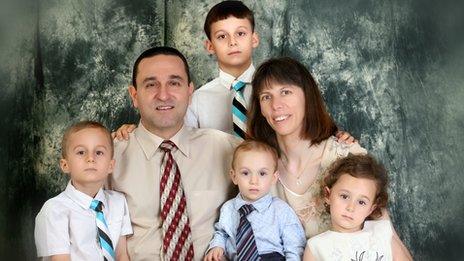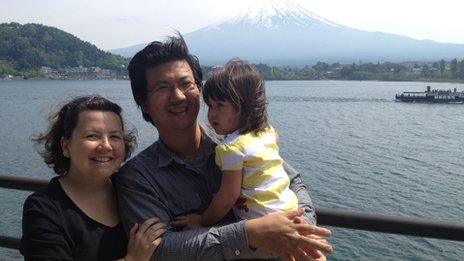British mother had abortion 'because of visa rules'
- Published
New rules for migrants from outside the European Union are causing anguish for families, says a new report. The Home Office has said the rules which came into force last July are to ease the burden of migration on the taxpayer. But British mothers and mothers-to-be say they are being unfairly penalised as they must now earn at least £18,600 a year to sponsor their spouse and more to sponsor their children. Here they tell the BBC of the difficult choices they are facing.
Amanda and Jack
Amanda (whose name has been changed) says she had an abortion because under the new rules her Filipino husband faced deportation if she had given up her up her well paid job to care for their baby.
I married my husband in summer 2012 but when I got pregnant I panicked. All that was going through my head was "you're going to lose him, you're going to lose him".
I earned over £40,000 the year my husband came to the UK with me. But my job is off-shore and if I got pregnant I could not work. There's no crèche out at sea and taking a year off just wasn't an option.
Whatever other work I might have been able to get in my village, I still couldn't have earned enough to satisfy the new rules. So I panicked.
My doctor said: "This is disgusting. This could be the last time you could have children." But I didn't feel I had a choice. I came out of the doctors crying - a married woman shouldn't have to cry and be forced into a decision like that.
I've had some counselling, I've been depressed. It destroyed a lot of things in our relationship for months.
If it wasn't for the immigration rules I wouldn't have had an abortion.
Shona and Elie Barakat
Shona says husband Elie has been effectively exiled from her and their four children in Lebanon for six months because of the new rules. She has had a miscarriage in his absence and says the situation is unbearable.
Sometimes the children don't want to speak with their father on Skype as they are so angry that I can't give them a date for his return.

Shona and her children have been separated from their father for six months
We married 10 years ago but it was 8 December when we were last together. He has missed Christmas, birthdays and important milestones with his children.
It's caused major emotional strain and I suffered a miscarriage without him present. I was under a huge amount of stress at the time.
I work in human trafficking services and I'm called in when victims need support. Elie is a minister in the Baptist church. I work part-time to look after our four children - all under eight - and because Elie isn't here I have to rely on benefits to survive.
Rather than carry on with the stress of being separated we've decided to go back to Lebanon - to a part of the country the Foreign Office advises against travelling to unless it's essential. It's either that or have no family life.
Gillian and Tsuyoshi
Gillian and her Japanese husband moved from London to Tokyo in 2006 to spend time with Tsuyoshi's family. She has always been the breadwinner but since their daughter was born she has reduced her hours to look after their baby. The family had planned to return to the UK but because the rules changed while they were in Japan, they say they are now exiled.
We've been married for nine years. Hazel is three and we're expecting another child in July. We want our children to experience both cultures - Hazel has a British passport. But if we wanted to return the new rules dictate that we can only do so if I become the breadwinner, depriving my young children of invaluable time with their mother.
Am I supposed to come to England without my family, for six months? Because that's what the rules say. My husband would be a single parent. It's crazy.

Gillian says she knows lots of British women in Japan trapped by the new rules
We do want to come back to the UK but to have that option taken away from us is upsetting and frustrating. I want my parents and Hazel's aunts and uncles to experience life with our children and I want our children to know their grandparents.
For British women with foreign husbands we don't have the choice. The new rules are very discriminatory against British women.
Sarah and Eduardo
After meeting in Portsmouth, Sarah and Chilean naval commander Eduardo (names have been changed) married and are adopting a baby. She speaks four languages, has two law degrees and is a former fast-tracked civil servant.
We find ourselves effectively exiled from our own country. We have significant savings, but not enough to make the £62,500 we need under the rules.
I am working as a translator in three languages but have always planned to take time to look after our baby. He has lived the first few months of his life in a children's home and I want to give him all the love and cuddles the world has forced him to miss out on.
Separating is not an option for us. We have a strong marriage and would never stay apart and risk our baby's stability and our wellbeing for the sake of these financial rules.
We just want to raise our children in an economically stable, loving, secure home with strong family values so that they can become good, secure, British and world citizens.